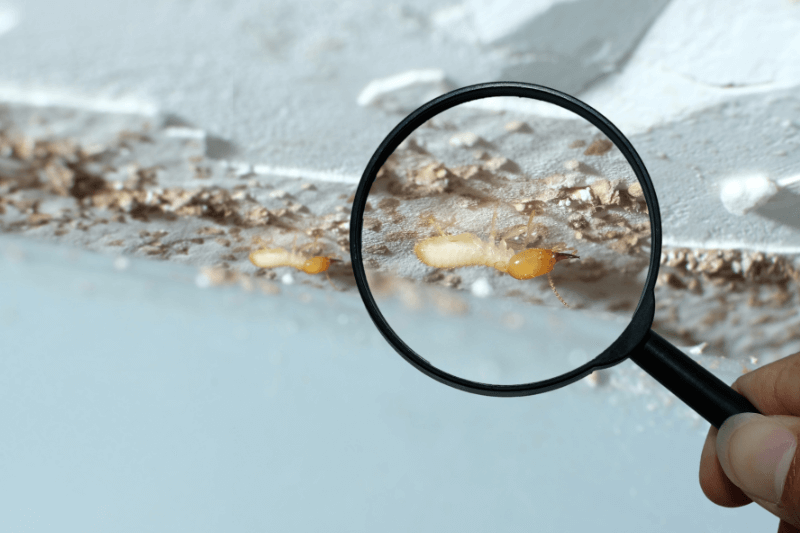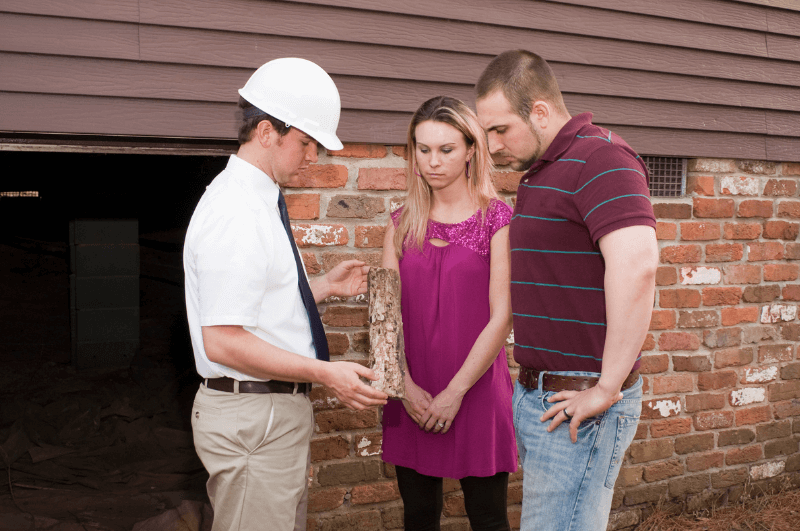
For many homeowners, discovering termite damage can feel like a nightmare. Over time, These pesky invaders can significantly compromise a home’s structural integrity. Yet, even with termite infestation, selling your house isn’t impossible. In fact, with the right information and approach, you can navigate this challenge effectively.
Termites Caused Damage: Can I Still Sell?
The presence of termite damage, depending on its severity, can lower the home value. Upon hearing the history of termite activity, potential buyers often become wary. They’re not just concerned about the damaged wood they can see, but the potential hidden issues lurking behind the drywall or in the crawl space.
Signs of termites, such as mud tubes, droppings, and visible damage to wood structures, can deter prospective buyers. However, not all is lost. Many homeowners have faced similar challenges and found ways to sell their property effectively.
A critical aspect is transparency. Disclosing the termite problem upfront to potential buyers can save a lot of hassle later on. Furthermore, having a recent termite inspection report can give interested buyers a clear idea about the extent of the damage and any ongoing termite activity.
A reputable pest control company can provide such an assessment, ensuring no surprises during the home inspection.
Navigating Repairs and Treatment
A proactive approach can make a huge difference. Depending on the severity of the infestation, homeowners can consider termite treatment and necessary repairs to enhance the home’s market value. This might involve removing and replacing damaged wood, treating the area to prevent future infestations, and taking preventative measures to stop termites from returning.
Sellers often wonder whether to sell a house as-is or fix it up. Understanding your house’s average renovation costs can help make this decision.
Selling a House With Termite Damage As Is
For some homeowners, dealing with repairs, termite control, and the potential for water damage can be overwhelming. That’s where selling a house as-is becomes an appealing option. By doing so, you can avoid the costs and time involved in fixing the house and pass those responsibilities on to the buyer.
Cash Offers: A Convenient Solution
Homeowners who sell their termite-damaged homes often find solace in cash offers. Real estate investors, flippers, or cash home buyers in Shorewood are typically more open to purchasing homes with issues. They have the resources, experience, and intention to renovate, resell, or rent these properties.
Sellers can benefit from a straightforward selling process, avoiding the rigors of the open market. Plus, homeowners can receive a fair cash offer, regardless of the home’s condition. It provides peace of mind, knowing they can move on without the shadow of termite issues looming over them.
While termite damage can be daunting, homeowners have options. Knowledge and transparency are key whether you decide to repair, treat, or sell as-is. By understanding your home’s condition, potential repair costs, and the benefits of selling for cash, you can make an informed decision that aligns with your goals.
Need To Sell Your House Fast?
We make it simple to sell your house with termite damage.
Just fill out the form below or give us a call at: (414) 488-0082 to get your free, no-obligation cash offer!
Removing Any Termites Before Repairing Damage
Before diving into repair work, it’s crucial to remove all traces of termite infestation. Overlooking this critical step can lead to more extensive damage in the future. Additionally, while signs of termite activity, such as mud tubes and droppings, can be visible, subterranean termites might be destroying out of sight.
Hiring a reputable pest control company is a wise first step. They can thoroughly inspect every nook and cranny of the house, including hidden spaces like crawl spaces and behind the drywall. These professionals have the tools and expertise to detect termite issues, ensuring every stone is turned on.
Choosing the Right Termite Treatment
Once termite activity is identified, the next step is selecting the most effective termite treatment. Various treatments exist, from baits and traps to more extensive fumigation methods. The choice often depends on the severity of the infestation, the types of termites present, and the house’s structural specifics.
Homeowners should be well-informed about the treatments proposed by the pest control company. While certain treatments are less intrusive, others might require homeowners to vacate their property for a few days. Additionally, preventative measures are essential after the treatment to ensure that termites do not return.
Another crucial point to consider is the termite warranty. Some pest control companies offer warranties that guarantee their work. This can be a reassuring factor for both the seller and prospective buyers, as it demonstrates a commitment to resolving the termite problem comprehensively.
Getting Termite Damage Repaired Before Selling
After ensuring that all termite activity has ceased, the next logical step is to gauge the extent of the damage caused. While minor damages like small holes in the drywall might be easy to spot, structural damage can be more challenging to detect.
Engaging a professional familiar with termite damage can help homeowners understand the full scope of necessary repairs. They can inspect areas like wooden beams, floor joists, and even foundational elements that the termite infestation might have compromised.
Calculating Repair Costs and Potential Impact on Home Value
When contemplating selling a house with termite damage, homeowners should know the associated repair costs. These can vary significantly based on the damage’s extent and the house’s size. For instance, replacing damaged wood in a small section of the house will be considerably less expensive than overhauling an entire foundational beam.
However, it’s essential to consider that repairing termite damage can increase the house’s market value. Home buyers often need help to purchase properties with a history of termite infestation and subsequent damage. But, if a seller can demonstrate that they have addressed the issue and made all necessary repairs, it can boost buyer confidence.
Positioning the Repaired Home in the Market
Once the house is free of termites and all damages are repaired, it’s time to position it in the real estate market. Using a real estate agent or realtor with experience selling homes that have undergone termite treatment and repair can be beneficial. They can craft a compelling narrative highlighting the homeowner’s proactive approach, ensuring prospective buyers that the house is in prime condition.
Moreover, for homeowners looking to expedite the selling process, reaching out to real estate investors can be a viable option. Such investors often have experience dealing with homes with termite issues and can offer a fair price without the traditional market hassles.
Reevaluating Your House to Sell After Termite Damage
Dealing with termite damage can be a significant setback for homeowners eager to sell their property. Realizing these tiny pests have caused havoc can lead to many questions regarding the home’s worth and how it should be presented to potential buyers.
Reevaluating your house after termite damage ensures you get the best possible price and experience a smooth selling process.
Understanding the True Extent of Damage
The first step in reevaluation involves understanding the true extent of the termite damage. While some signs of termite activity, like mud tubes or droppings, are noticeable, the real damage is hidden within the walls, beams, or crawl spaces. Hiring a termite inspector or a professional with expertise in structural damage can provide a clearer picture of the damage’s depth. They can identify compromised areas and guide the necessary repairs.
Adjusting the Home Value
Once you grasp the damage’s scope, the next step is to adjust your home’s market value. Termite damage, especially if extensive, can significantly impact a property’s worth. Consulting with a real estate agent familiar with termite issues can help determine an adjusted price. They’ll consider the repair costs, the home’s location, age, and comparable sales in the area.
Remember, the goal is to set a realistic price reflecting the house’s current condition and potential after repairs.
Repair or Sell As-Is?
This is a crucial decision point for homeowners. Repairing termite damage can be expensive, but it can also lead to a higher selling price and a quicker sale.
On the other hand, some homeowners might choose to sell the house as-is, especially if they’re in a hurry or can’t afford the repairs. If you opt for the latter, be prepared to be upfront with potential buyers about the extent of the damage.
Marketing Your Home Post-Termite Damage
Once you’ve decided on repairs and set a new price, it’s time to market the house. How you present your home after termite damage can make a significant difference. Emphasize any repairs or termite treatments undertaken, highlighting warranties or guarantees from pest control companies. Providing prospective buyers with peace of mind is essential.

Seeking Expert Opinions and Solutions
The process of reevaluating a home post-termite damage can be overwhelming. But, remember, you’re not alone. Numerous professionals can guide you, from real estate agents to termite experts. Seeking their opinion can help make informed decisions.
Conclusion
Termite damage is challenging, but you can navigate the selling process effectively with the right approach. If you’re facing such issues and need immediate assistance, don’t hesitate, at Cream City Home Buyers we buy houses in Waukesha today for a swift and stress-free solution to your property problems.
